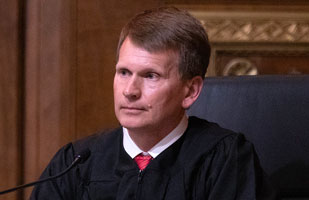Sports Principles Also Apply to Judge’s Work

Second District Judge Christopher Epley hears his first Supreme Court oral arguments.

Second District Judge Christopher Epley hears his first Supreme Court oral arguments.
The ball can bounce any way on a soccer field or in a courtroom. That’s something Second District Court of Appeals Judge Christopher Epley knows well as a legal professional and former collegiate athlete.
“You learn to win and lose gracefully. It’s how you handle the results and what you learn from them,” Judge Epley said.
Last Wednesday, he experienced one of the biggest thrills of his career as a first-time assigned judge on the Supreme Court of Ohio.
“It feels great. This is a remarkable opportunity,” said Judge Epley.
The Second District judge heard two cases. The first case raised the question of whether a utility rate plan could be based on a previous rate of return that would be a windfall for a utility. The second case was the appeal of a criminal conviction involving sexual imposition and whether the victim had the ability to consent. Judge Epley sat for Justice Joseph T. Deters, who recused. According to the Ohio Constitution, when there is a justice recusal, the chief justice selects an appellate court judge to sit on the Supreme Court for the case.
Judge Epley has been on the appellate bench since 2021. Before that, while working as a private attorney, he also served as an assistant prosecutor, magistrate, and law professor. He saw how each opportunity could enhance his understanding of the law, similar to developing skills on the soccer field.
“I was a midfielder at the center of everything, helping the defense and providing assists to the forwards,” Judge Epley said. “It’s the same approach as an attorney, judge, and law professor. Your work is to try and elevate others around you.”
As a judge, he views leadership as an obligation to do more. So, he also serves on the Supreme Court Commission on Professionalism, and looks for every opportunity to educate community members about the judicial system and the role of the appellate courts. He says it’s like being a referee in soccer, there to make sure both sides play by the rules so the best team or argument wins.
“We have rules to live by because people push boundaries,” said Judge Epley. “If we didn’t need the law or rules, we wouldn’t need judges.”


